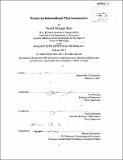Essays on international macroeconomics
Author(s)
Rees, Daniel
DownloadFull printable version (18.47Mb)
Other Contributors
Massachusetts Institute of Technology. Department of Economics.
Advisor
Ivan Werning and Guido Lorenzoni.
Terms of use
Metadata
Show full item recordAbstract
This thesis examines the impact of terms of trade shocks on commodity-exporting small, open economies. The first chapter examines whether households, firms and policymakers in these economies can distinguish between temporary and permanent commodity price shocks. I find that they are largely unable to do so. In fact, my model suggests that the expected future path of commodity prices following a temporary price shock is almost identical to the expected future path of commodity prices following a permanent price shock. However, I also find that these information frictions reduce the magnitude of business cycle fluctuations, contrary to popular belief. In the second chapter I describe optimal monetary policy in an environment where agents cannot directly observe whether commodity price shocks are temporary or permanent and where an economy's non-commodity sector features a learning-by-doing externality. I find that under optimal monetary policy the non-commodity sector contracts by more during a transitory commodity price boom under incomplete information than it does under full information, but by less during a permanent boom. I also examine the performance of simple monetary policy rules. A policy of responding strongly to deviations of home-produced goods inflation from target with a modest response to changes in the nominal exchange rate comes close to replicating the welfare outcomes of optimal policy. In contrast, an exchange rate peg generally produces large welfare losses. The third chapter, co-authored with my classmate Patricia Gomez-Gonzales, examines the consequences of changes in the volatility of commodity price shocks on commodity exporters. We first demonstrate the existence of time-varying volatility in the terms of trade of a selection of commodity-exporting small open economies. We then show empirically that increases in terms of trade volatility trigger a contraction in domestic consumption and investment and an improvement in the trade balance in these economies. Finally, we construct a theoretical model and demonstrate that it can replicate our empirical results.
Description
Thesis (Ph. D.)--Massachusetts Institute of Technology, Dept. of Economics, 2013. Cataloged from PDF version of thesis. Includes bibliographical references (p. 167-174).
Date issued
2013Department
Massachusetts Institute of Technology. Department of EconomicsPublisher
Massachusetts Institute of Technology
Keywords
Economics.